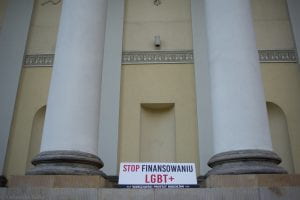In 2015, the Law and Justice Party (PiS) became the majority in the Polish Parliament alongside the presidency for the first time since 2007. The Law and Justice Party is a right-winged populist party that has faced ongoing controversy and scandals since its formation in 2001. The Law and Justice Party began as a center-right party with an emphasis on Christianity. The party began forming coalitions with far-right parties in 2007, which positioned its ideology closer towards nationalism and populism. During the last few years support dwindled for the PiS; however, their messages calling for family unity and Christian values have appealed to deeply religious sectors of the country. A country that is trending towards nationalism and populism risks violating the rights of those that the nation deems as “other”. By establishing a national identity, particularly around religion, they are also establishing those that do not belong to the national identity. This carries the risk of isolating and ostracizing individuals.

The Close Relationship Between Religion and Government
The Polish identity is tied very closely to Catholic beliefs and practices. Around 87% of Polish people identify as Roman Catholic. In Poland Catholic values are taught in public schools, over ⅓ of Polish citizens attend church regularly, and the Polish government has an intense working relationship with the Catholic Church. Public ceremonies are often held with the blessings of priests, and church officials often act as a lobby group having access to large amounts of public funding. Priests in the countryside of Poland often campaign for members of the more conservative party who support legislation that aligns with the ideals of the Catholic Church. This close relationship is criticized because of the archaic and often divisive legislation that the Church tends to support. The Catholic Church’s alignment with the government will inevitably ostracize those who are not Catholic as well as those who live their life in a way that the Catholic Church condemns. The issue is at a governmental level, this allows for discriminatory policy to be passed.
President Duda and the 2020 Elections
The support of the Catholic Church was paramount in the Law and Justice Party candidate winning the 2020 Presidential election. President Duda, the PiS candidate, narrowly won re-election after a very divisive campaign against the progressive Mayor of Warsaw. President Duda exploited negative rhetoric citing LGBT ideology as being more destructive than Communism. Poland’s history of Union of Soviet Socialist Republics (USSR) occupation accompanied with this rhetoric led to the success of President Duda in the 2020 Presidential election. PiS members and Catholic Clergymen asserted LGBT values as being in opposition to family values and sought to associate the LGBT community with pedophilia. President Duda’s narrow win ignited mass unrest spreading throughout Polish cities as progressives viewed his win as a step back for LGBT rights in Eastern Europe.

LGBTQ Free Zones
Anti-LGBTQ rhetoric did not begin in the 2020 Polish elections. Over 100 towns and regions around Poland have declared themselves LGBTQ Free Zones since 2018. These declarations are largely symbolic; however, they have further divided the country and suppressed the LGBT community. LGBTQ free resolutions have been pushed by the Catholic Church and politicians across Poland. Protests against these zones have resulted in mass countermarches of right-wing Poles that have ended in violence. The LGBTQ community has continued to face oppression from their government and these zones just serve as a way to further disenfranchise them.

Access to Abortion
Along with the anti-LGBT legislation, Poland’s Supreme Court recently ruled in favor of strict regulation of abortion. Poland previously had regulations only allowing abortion access to victims of rape, incest, preservation of the mother’s life, and if the baby has fetal defects. Legal battles erupted in 2019 by the Law and Justice Party to ban abortions in the event of fetal defect. Judges nominated by PiS members ruled in favor of a ban of all abortions due to fetal defects, which account for approximately 98% of all Polish abortions. The decision led to outcry across Poland inspiring protests in almost every major city.
What is the future of Poland?
The future of Poland is unknown, and it is clear the Polish government has become increasingly populist and nationalistic. Public figures are using rhetoric that divides the general population from “western elites” and activists within their country that seek to strive towards more encompassing human rights. Polish activists are fearful of future legislation that will further violate human rights. International human rights activists, the United Nations (UN) and European Union (EU) have all attempted to pressure Parliament to pass legislation showing outward support of the LGBTQ community. Polish officials responded claiming LGBTQ people have equal rights in the country and organizations should instead focus energy on Christian discrimination taking place internationally. As part of the international community, we can demonstrate our support for the people of Poland by staying up to date on what is happening there. It is also important to create dialogue around the issues in Poland which can include everything from social media posts to organizing events that bring awareness to the situation.

